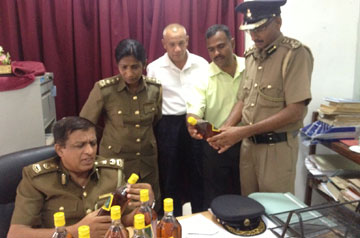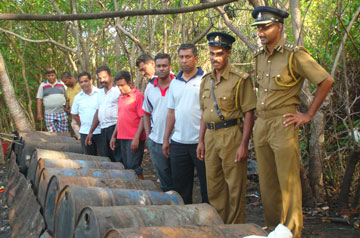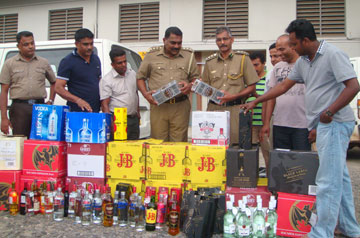|
Unprecedented move:
Excise Dept throws dragnet at sharks
By Kurulu Kariyakarawana
|

Superintend of Excise BSO Rohan Wijeratne |
When it comes to crime busting the usual rhetoric of "Throw the
dragnet on the sharks instead of pursuing the sprats”. Although many law
enforcement agencies like the Police, Customs, Narcotics detection units
function in the country to fight crime and detect illegal goods coming
into the country, this statement was only empty rhetoric and never
seemed to be applied in its true sense in the past.
Any agency that deals with detections are given a target to achieve
for a month or year. From agency to agency and unit to unit these
targets vary. It is evident that most law enforcement authorities set a
higher target and the only concern is the number of cases being detected
and not the quality of the case . It has become a custom in many offices
that promotions and merit of officers who work in these units depend
solely on the number of targets they meet within a given period.
Although this seemed to be a normal practice, it is questionable whether
the purpose of detections is fulfilled by sticking to mere numbers
rather than arresting major culprits or seizing larger quantities of
contraband.
Making a change in this conventional method, the Excise Bureau of
Special Operations recently launched a system to conduct detections in a
more productive manner rather than going for a large number of targets
to be achieved within a given time frame. The Bureau of Special
Operations is a special unit attached to the Colombo Excise Department
that is vested with the powers to conduct raids in any part of the
country without permission from Divisional Excise units or the Police.
Beginning with illicit liquor, the unit is given the authority to make
detections of unlawful possession and sale of unlicensed liquor,
unlawful sale and possession of tobacco, sale, possession and
cultivation of cannabis-Ganja, unlawful sale and possession of toddy as
well as illegal manufacture of unauthorised liquor.
For a long time the set standard of this unit was to act on targets
being introduced by superiors and to conduct as many detections as
possible. But this criterion was changed when the target system was
abolished and instead a quality detection scheme was introduced.
 |
| Deputy Excise
Commissioner (Crimes) Wasantha Dissanayake |
 |
| Superintend
Rohan Wijeratne with Excise Inspector H G P Ranaweera after a
successful hooch raid |
 |
| Excise
Superintend Rohan Wijeratne and OIC BSO Rosmand Fernando
following a liquor raid |
The mastermind behind this new system Director Excise BSO
Superintendent Rohan Wijeratne speaking to the Sunday Observer said that
the detections previously conducted by the unit were of a low standard.
When analysing the detections made in 2013, this was evident where the
unit had made several low quality detections to hit numbers. When it
comes to the seizure of contraband, although targets given by the Excise
Commissioner General had been met, they were of a poor quality and
effort expended was useless. Fuel and transport costs have risen as the
officials of the unit raided numerous outstation points to meet targets.
Because of the number of small cases detected, a large number of
unsolved court cases are pending with many warrants being issued on the
culprits. Another problem is that the targets are so high preventing the
competent and skilled officers from working on major cases but to fulfil
given targets. Besides the sole reason of having a special unit is to
work on major cases which cannot be detected by divisional units due to
practical issues.
A special unit is normally formed with a hand-picked staff who are
skilled and competitive in crime fighting and running raids. But the
expected outcome cannot be achieved from these officials if they are
bound with a large number of insignificant low quality cases.
Considering this situation, Superintend Wijeratne proposed that large
scale detections should be prioritised in the future and special
facilities as well as encouragement be given to such officers. As a
result a minimum limit is set up in detecting a perpendicular type
contraband in the future. This system is in operation since March 2014
and a significant difference has been seen as of now. The minimum limit
to detect has been set up according to the contraband.
The minimum limit of Unlawfully Manufactured Arrack (UMA) or also
known as Kasippu, that could detected is increased to 10 barrels. The
limit of Possession of Unlawfully Distilled Spirits (PUDS), Unlawful
Sale of Arrack (USA) and Unlawful Sale of Foreign Liquor (USFL) is 10
litres. Possession of Unlawful Manufacture of Liquor (PUML) or also
known as Goda and Unlawful Possession of Toddy (UPT) is 100 litres.
The points given on the fines imposed on the seized items is
increased with 100 points for a fine of Rs.750, 000, fifty points for a
fine of Rs.375, 000, twenty five points for Rs.200, 000 and 12.5 points
for a fine of Rs.100, 000.
According to this new system, officers will be encouraged to work on
bigger cases instead of going after minor detections. Previously a
regular Excise Guard was given a target of 144 cases per annum to
evaluate his efficiency.
Now this figure has been equalled to 100 points a year. In the future
an Excise Guard does not have to carry out 144 insignificant minor cases
but could achieve his target by working on a major case or two that
could gain him 100 points at once. This will indirectly enhance the
quality of the raids being conducted and most importantly the 'bigger
fish' could be dragged out instead of pursuing the sprats, Superintend
Wijeratne said.
Showing results of this new system the BSO has conducted 312 cases
during the first five months of this year where a number of major cases
were reported. In January there was a detection of illicit liquor
amounting to 520 litres in Waikkal and another detection of 1, 520
litres in Avissawella in March.
Also significant detections were carried out in Galle, Kegalle, Mount
Lavinia, Seeduwa, Gampaha and Pinnawala. |

